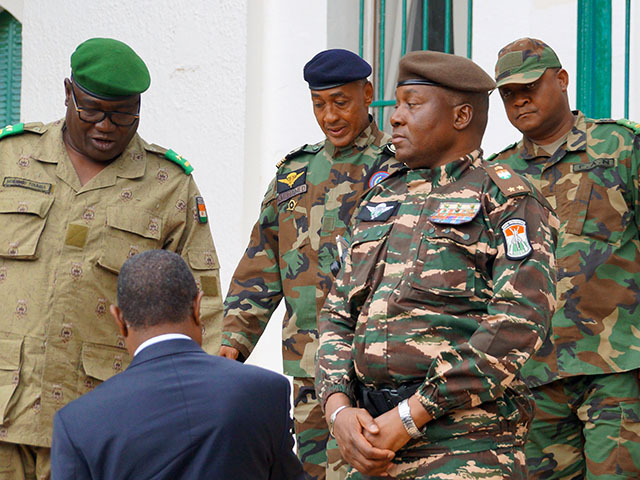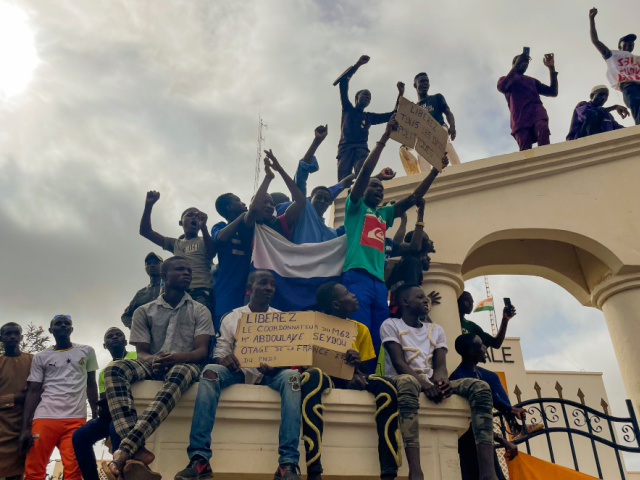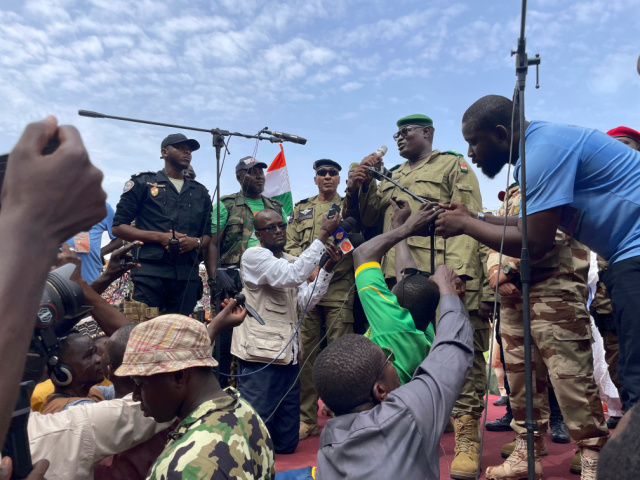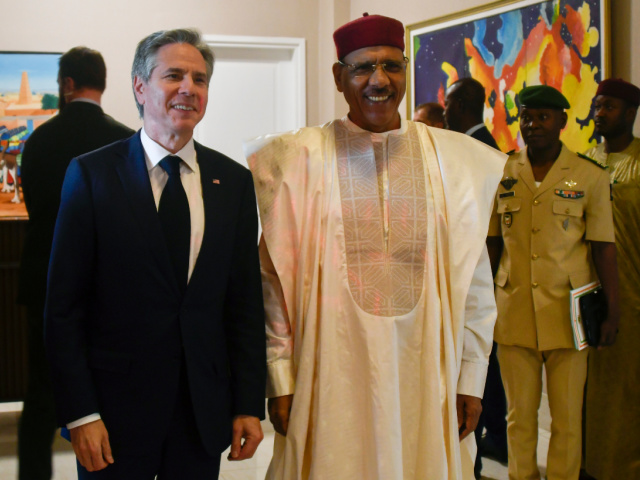Niger: Coup Leaders Reject U.N. Mission, Accuse France of Freeing Terrorists on Purpose
The leaders of the “National Council for the Safeguard of the Homeland,” a group of soldiers who staged a coup in Niger on July 26, failed to allow diplomats representing the United Nations and African Union from entering the country on Tuesday, claiming public “anger” made it unsafe for them to land.
The Council — led by the former head of the presidential guard, General Abdourahamane Tchiani — seized power via a nationally televised address in late July, ousting democratically elected President Mohamed Bazoum. The coup plotters are currently keeping Bazoum under house arrest at the presidential estate in Niamey, the national capital, and have allowed him to maintain communications with the outside world, including holding conversations with Secretary of State Antony Blinken and publishing an opinion article in the Washington Post demanding international intervention. The group has rejected restoring Bazoum to power, however, accusing him of squandering international aid, including from the United States, meant to fight radical jihadist terrorist groups.

Abdourahmane Tchiani and other army commanders held a meeting in the capital, Niamey, Niger on July 28, 2023. (Balima Boureima/Anadolu Agency via Getty Images)
Tchiani’s group claims it will prioritize stabilizing the country and eliminating jihadist threats. It issued a formal statement on Wednesday accusing France, Niger’s former colonial ruler, of attempting to hurt the military junta by deliberately freeing terrorist leaders from their military facilities and violating Nigerien airspace.
Coup leaders shut down the entirety of Niger’s airspace on Sunday in response to threats from the Economic Community of West African States (ECOWAS) that it would consider force to restore Bazoum’s government.
ECOWAS, led by Nigeria, issued a statement initially in response to the coup demanding that Tchiani vacate power by August 6 or face a string of sanctions and the potential “use of force.” The threat of invasion prompted the governments of neighboring Mali and Burkina Faso, which also recently fell to military coups, to declare that they would consider any military action against the Niger coup leaders a “declaration of war” against themselves, creating the possibility for a world war.
The ultimatum came and went without the promised “use of force.” The president of Nigeria, Bola Tinubu – who also serves as the chief of ECOWAS – called for an emergency meeting to address the future of the Niger coup scheduled for Thursday.

Supporters of Niger’s ruling junta gather at the start of a protest called to fight for the country’s freedom and push back against foreign interference in Niamey, Niger, Aug. 3, 2023. (AP Photo/Sam Mednick)
In the meantime, ECOWAS organized a diplomatic delegation along with representatives of the African Union and the U.N., which planned to land in Niamey on Tuesday. The coup leaders refused to allow the diplomats entry into the country. According to the local outlet aNiamey, the coup government issued a statement claiming, “the current context of people’s anger and revolt following sanctions imposed by ECOWAS does not allow us to welcome the so-called delegation with the required serenity and safety.”
In addition to the threat of the use of force, ECOWAS announced a series of sanctions on the Nigerien economy, including cutting off business with the coup government and freezing critical assets. On Tuesday, Tinubu announced expanded sanctions including Nigeria ceasing to provide Niger with 150 megawatts of electricity a day, as it had previously done, and unspecified financial sanctions on individuals involved in the coup.
The coup’s Foreign Affairs Ministry nonetheless claimed to be interested in “discussions with delegations or emissaries concerning the situation in Niger,” suggesting it may be open to a similar delegation in the future.
ECOWAS had already sent diplomats to Niamey on August 4, but they departed the country with no significant progress made between the coalition and the coup plotters. Niger is a formal member of ECOWAS, though no longer enjoying a democratically elected government may result in its suspension from the bloc.

Mohamed Toumba, one of the soldiers who ousted Nigerian President Mohamed Bazoum, addresses supporters of Niger’s ruling junta in Niamey, Niger, Sunday, Aug. 6, 2023. (AP Photo/Sam Mednick)
Following the failure of the ECOWAS/African Union/U.N. group, the Tchiani group took aim at France, with which Bazoum had maintained friendly relations and military cooperation against jihadist entities. The “National Council for the Safeguard of the Homeland” issued a statement on Wednesday claiming French forces, “with a will to destabilize,” flew an aircraft into closed Nigerien airspace. The Council also accused French troops of “unilaterally releasing terrorist elements prisoners,” including 16 alleged terrorist group leaders, according to aNiamey.
The French government, through an anonymous source, denied the allegations. Speaking to the Agence France-Presse (AFP), the anonymous official said that the flight in question occurred, but that Tchiani’s group had authorized it. As for the other accusations, “no terrorist has been freed by French forces,” the source claimed.
Both France and America have rejected Tchiani as a legitimate leader and insisted on continuing to recognize Bazoum. They have rejected Bazoum’s call for a military intervention against Tchiani, however, and in the case of the United States, attempted to maintain a level of normalcy of operations on the group.

U.S. Secretary of State Antony Blinken, left, poses for a photo with Nigerien President Mohamed Bazoum during their meeting at the presidential palace in Niamey, Niger, Thursday, March 16, 2023. (Boureima Hama/Pool Photo via AP)
America maintains a presence of over 1,000 troops in Niger, stationed there to help train Nigerien forces and fight radical Islamist terror groups. The Pentagon confirmed last week that it had suspended training operations, given that the Nigerien military issued a statement supporting Tchiani, but has repeatedly denied it has a reason to believe U.S. troops are in danger and not evacuated any soldiers.
“In terms of our force posture, nothing has changed,” Deputy Pentagon Press Secretary Sabrina Singh told reporters on Tuesday. “As you know, we have paused on an interim basis some security cooperation efforts and we’re not conducting military training right now, as things remain pretty fluid within Niger, and we continue to monitor what’s happening on the ground there.”
Singh argued that the refusal to move troops or change military posture in Niger “sends a message that we’re committed to the region, we’re committed to Niger. … we want to send a message to the Nigerians that we stand with you, and you’re seeing the embassy still operating as well and is open in Niger.”
The U.S. embassy in Niamey is not fully functional. A day after the Pentagon claimed last week to have no indication of threats to Americans in the country, the State Department evacuated non-emergency personnel from the embassy in Niger, the third embassy evacuated during far-left President Joe Biden’s tenure.





Comments are closed.